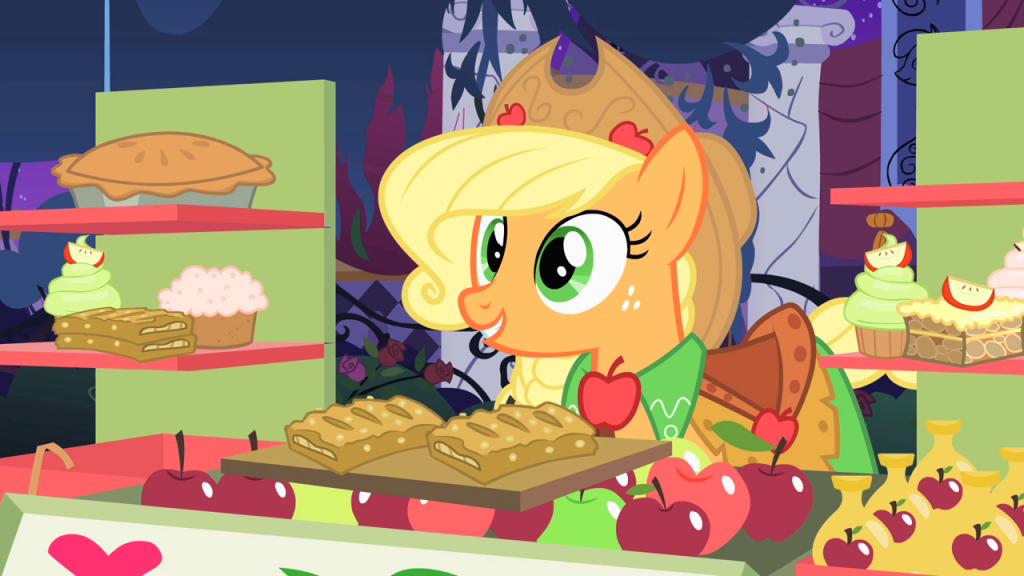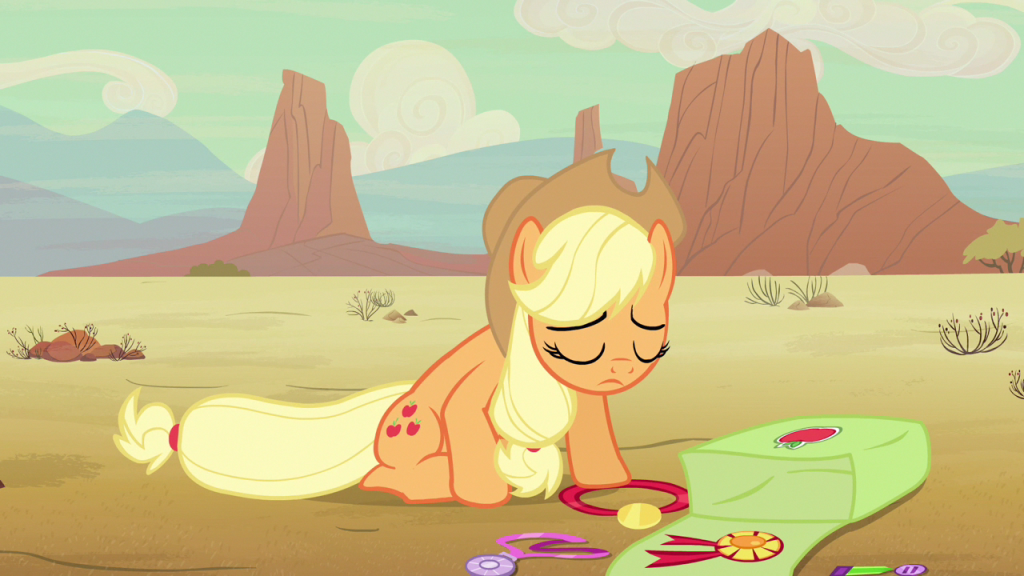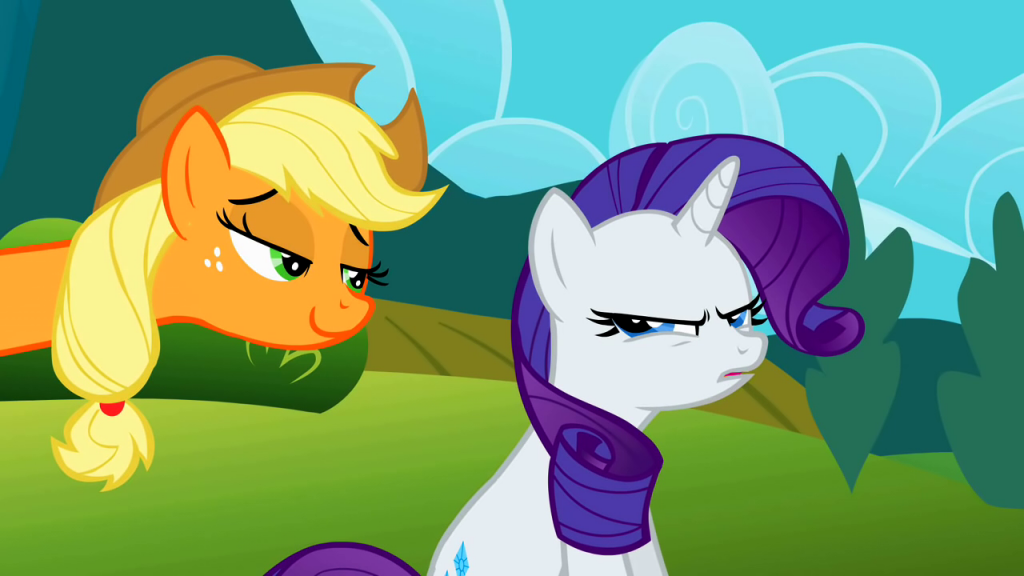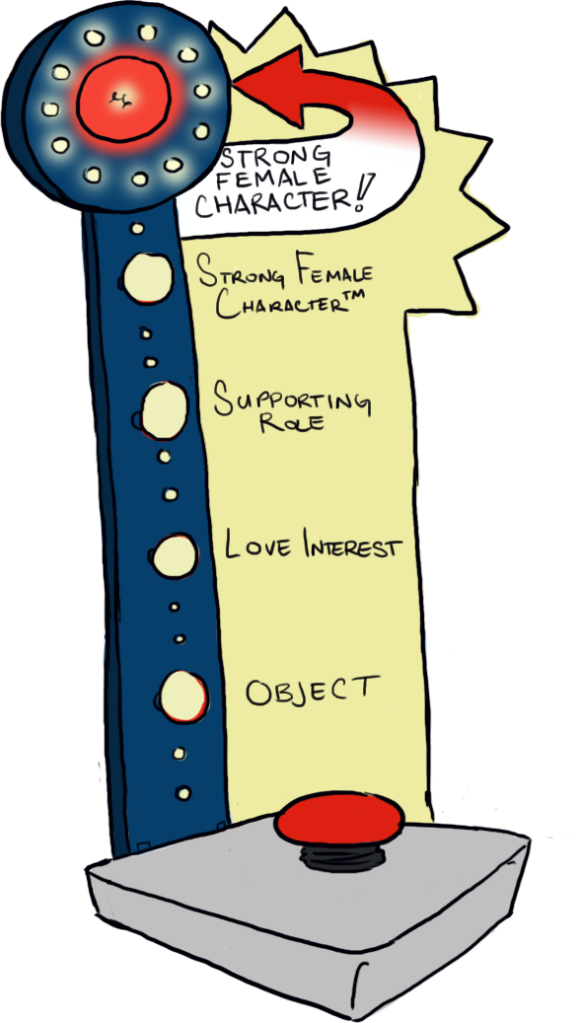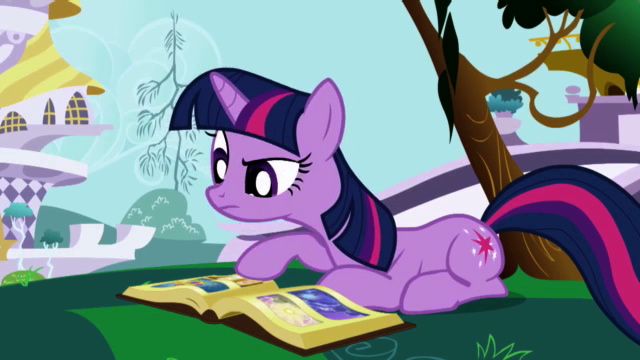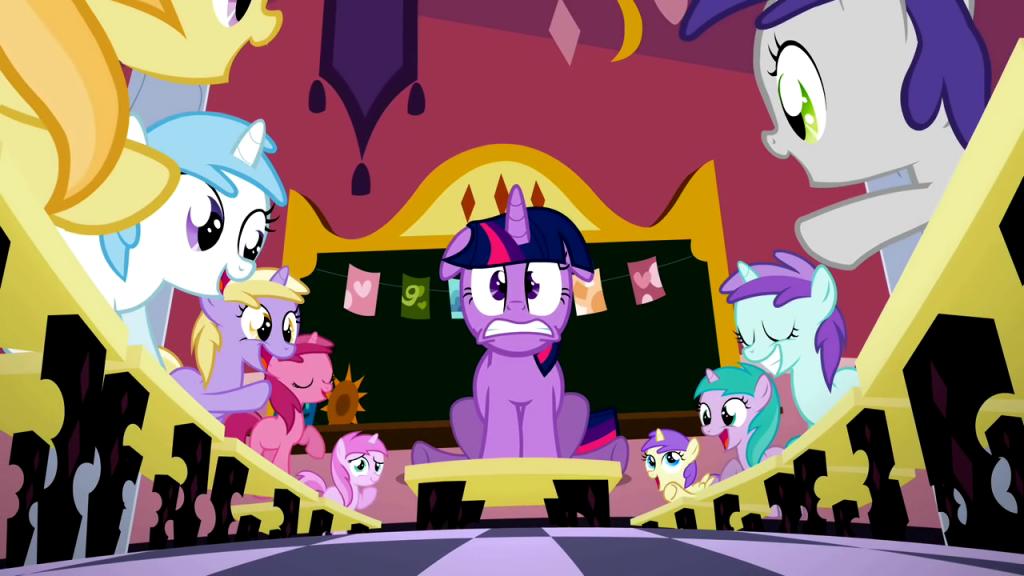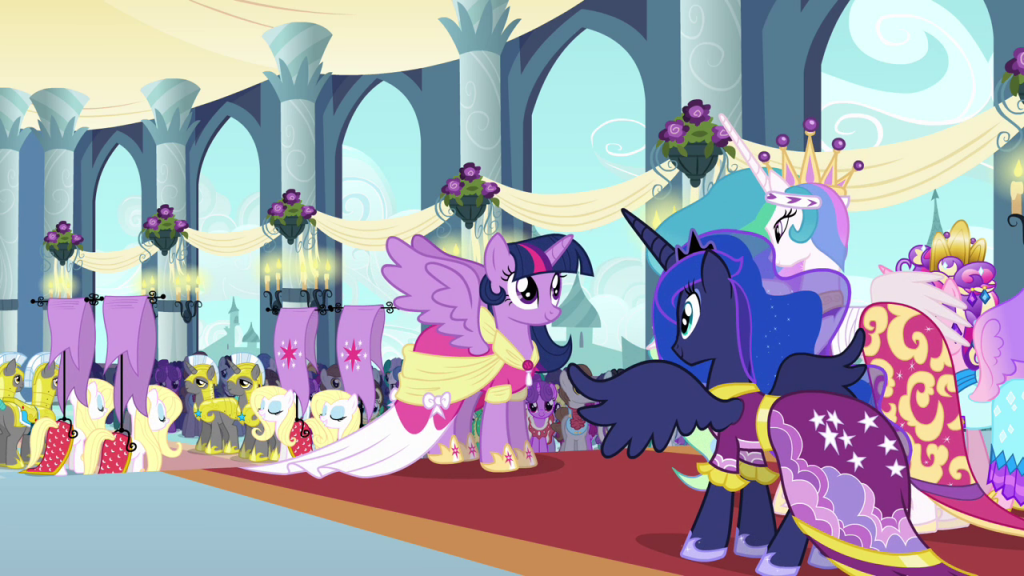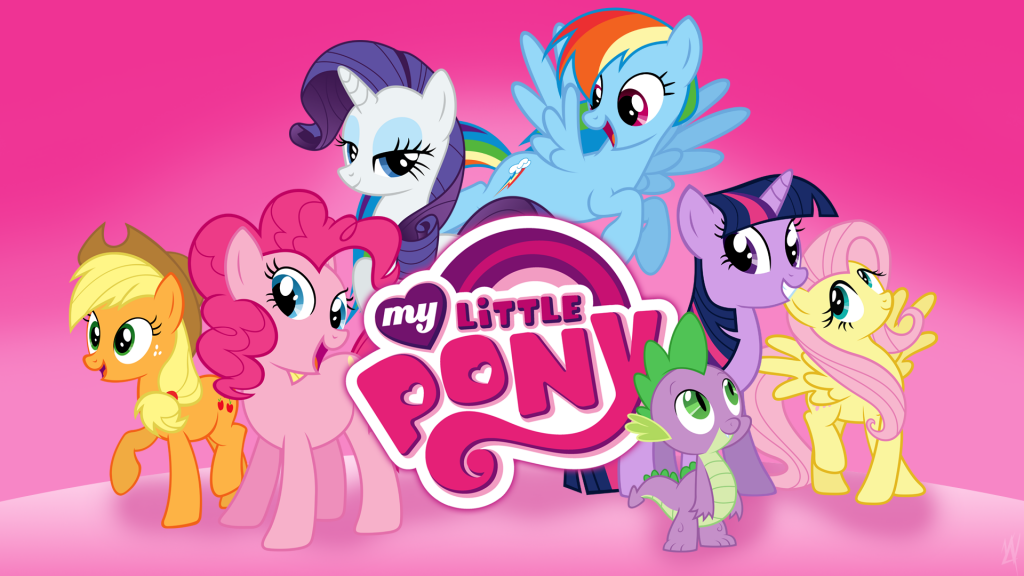 |
| MyLittleVisuals |
While watching a show with “Friendship is Magic” in the title, it’s almost inevitable that you would try to figure out which character is the best friend. Well, perhaps not inevitable, but I’m sure that people who are not feminist bloggers who overidentify with cartoon unicorns also, on occasion, have these thoughts. In my case, these thoughts have led me to proclaim Applejack the quintessential friend.
An argument could be made that Twilight Sparkle actually holds this title, but I think that her storyline almost precludes her from it. As I see it, Twilight’s quest to embrace friendship is part of her larger arc of becoming a princess. She has to learn the ins and outs of social interaction because doing so will allow her to become a better leader, someone who can combine historical knowledge, a critical mind, and a compassionate heart. Becoming a princess and an Alicorn also necessarily distances her from her friends -- even if the show, by nature of being for children, never actually explores this. As a princess, Twilight is now in a position of authority, a teacher instead of a fellow student; as an Alicorn, she is a sort of superbeing whose lifespan will likely greatly exceed those of her friends. Even her friendship, while sometimes demonstrated in normal situations, receives greater focus when it helps her to save her friends or, on several occasions, whole cities. She does friendship on an epic scale.
Applejack, by contrast, is a stellar everyday friend. In “Applebuck Season,” she describes herself as the “loyallest of friends and most dependable of ponies,” and her companions in the “Mane Six” clearly agree. Rainbow Dash, Pinkie Pie, and Fluttershy all sing her praises as she devotes her time to helping them with flying tricks, baking, and a bunny census. What makes this more impressive is her willingness to help out even when she has worked herself to exhaustion on her farm.
Applejack’s humility makes even the most extraordinary deeds just a matter of course. When, in “Applebuck Season,” she receives an award for saving the town from a cattle stampede, she brushes it off by stating that she likes helping the pony folks. Later, in “Spike at Your Service,” she saves Spike from a pack of timberwolves and informs that “that’s what friends do.” She seems almost incapable of seeing her actions for the feats that they are, because, according to her standard of friendship, that’s simply what you do.
Applejack’s high personal standards differ in some key ways from those of Twilight Sparkle. Twilight works to impress her powerful mentor, but her harshest critic is herself. She is driven to meet impossible standards that she has set for herself, and she is usually the one who imagines the terrible punishments that she will receive for failing to meet them. More often than not, in Twilight’s mind, “Princess Celestia” is not the actual Alicorn, but the name that Twilight gives to her self-implemented standards. Even when ostensibly trying to meet others’ expectations, Twilight is striving to meet her own.
While she is similarly driven to succeed, Applejack is motivated by other people. “Applebuck Season” begins with her assuring her injured brother, Big Macintosh, that she can harvest the entire apple crop herself. Making a nearly impossible task more difficult, she decides to fulfill her promises of helping her friends, leaving herself no time to sleep. Twilight, intimately familiar with the signs of a pony who’s working herself too hard, eventually makes Applejack see that she should put aside her pride and allow her friends to help her. Her obsessive need to be the most dependable of ponies causes her to be a hindrance rather than a help. It also makes it seem as though Applejack is resigned to being the one who works harder in her relationships; she is proud of being dependable, and part of this is not depending on others.
Another example of Applejack’s need for approval occurs in “The Last Roundup.” The ten-time rodeo champion of Ponyville, Applejack sets out for the Canterlot rodeo to win some blue ribbons and prize money she’s already promised to the town to fix the town hall roof. When, at the end of the competition, she doesn’t come home, her friends set out to find her. She is hiding out at a cherry orchard, unable to face the townsfolk after failing to secure the promised money and winning only second, third, and fourth place ribbons. She tells her friends that she “couldn’t come home a failure,” disappointing all the people that she had hoped to make proud. Again, the other ponies remind her that she can rely on them to support her, and that she is allowed to be less than perfect.
Of course, this doesn’t prevent her from struggling with the same problem in the third season, when she volunteers to organize the Apple Family Reunion. However, these are special circumstances, because there is nothing more important to Applejack than her family. This is made abundantly clear throughout the series, but most obviously when she calls her friends her family when they help her to keep Sweet Apple Acres from the clutches of the Flim Flam brothers. Applejack is devoted to her family and to the family business, shown on many occasions to be a fantastic sister and granddaughter.
It should come as no surprise, then, that when she gets the opportunity to put together a family reunion, she sets out to make it the most memorable reunion of all time. Unfortunately, she gets too caught up in proving herself and focuses the event on productivity instead of personal connections. When it becomes clear that the event is on track to be a complete failure, she manages to salvage the day after she is reminded that a family reunion should be intimate, not epic.
Because it is intended for young girls, one of my favourite aspects of the show comes from the way it uses its lesson-based format. When one of the ponies learns a lesson, they write to Princess Celestia not to tell her how they messed up, but to share with her the story of their personal growth. The overall message is not “making this mistake makes you a bad person, so don’t do it”; instead, it’s “you’re pretty awesome, but here’s how to be even more awesome in the future.” It’s inherently positive, and it builds girls up without breaking them down first.
Therefore, because Applejack is such a great friend, her character can withstand a few lessons about the don’ts of friendship. The best example occurs in “Look Before You Sleep,” in which Applejack and Rarity end up at an impromptu slumber party at Twilight’s house. Over the course of the episode, they engage in a long argument that basically boils down to function versus form, as the practical Applejack tries to get things done and the finicky Rarity tries to keep everything, including herself, beautiful. When Applejack accidentally fells a tree into Twilight’s treehouse, she has to swallow her pride and ask for Rarity’s help to fix it. Forced to work together, they realize that they were both being foolish, and they become less critical of what they viewed as the other’s failings.
It’s a testament to the show’s unexpected depth that Applejack’s hostility toward Rarity has its origins in Applejack’s own backstory. When she was younger, Applejack decided to leave Sweet Apple Acres and become a city pony in Manehattan. There, she was groomed to look and sound like she belonged, even as she found that she didn’t. Upon returning home, she received her Cutie Mark, and learned that running the orchard was her destiny. Although her issues with Rarity stem, on first glance, from their very different personalities, it is also possible that the problems on Applejack’s side come from the memory of trying to be something she isn’t. For a pony whose identity is based on honesty, the reminder of her false self would be tough to face and even tougher to befriend.
Still, Applejack manages, because she knew, long before Twilight Sparkle arrived in Ponyville, the importance of interpersonal relationships and (I can’t believe I’m saying this) the magic of friendship.
